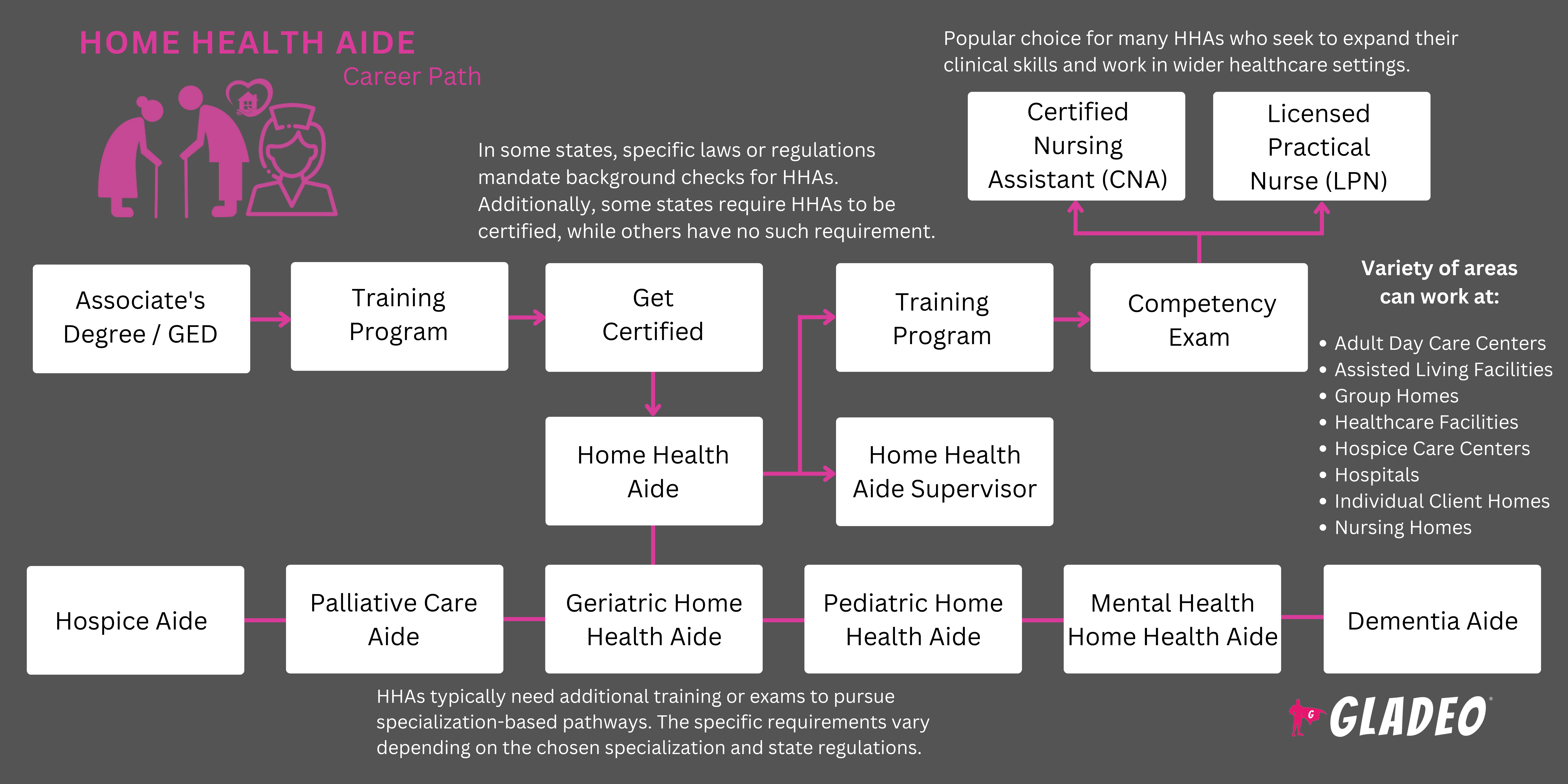Spotlights
Caregiver, Certified Home Health Aide (CHHA), Certified Medical Aide (CMA), Certified Nurses Aide (CNA), Home Attendant, Home Care Aide, Home Health Aide (HHA), Home Health Provider, Hospice Aide, In Home Caregiver, Personal Care Assistant
Home Health Aides (HHAs) provide in-home care and support to patients of all ages who are chronically ill, disabled, recovering from surgery or hospitalization, or have special needs. They can even assist mothers of newborn children in situations where extra support is needed.
Known as Personal Care Aides in some states, HHAs ensure the patients under their care are safe, comfortable, and well taken care of without having to stay in a healthcare facility. Because care is given in homes, patients may be referred to as “clients” instead. Duties include assisting with mobility and exercises, personal hygiene, dressing, and eating meals.
As frontline members of a patient’s larger healthcare team, a Home Health Aide can directly observe behaviors and changes which they can report to nurses, doctors, and other providers. These actions can lead to timely medical interventions, which can significantly increase a patient’s lifespan. HHAs also perform basic medical tasks like monitoring vital signs or helping with medications in some cases. They act as caring companions, helping to alleviate potential loneliness and boosting patient quality of life!
- Making a direct impact on the health, lifespans, and daily quality of life of patients
- Growing demand in the healthcare field
- Numerous opportunities for personal and professional growth
Working Schedule
Home Health Aides work part-time or full-time. Schedules can include early mornings, late evenings, weekends, or overnight shifts.
Nhiệm vụ tiêu biểu
Help patients (aka clients) with personal hygiene, grooming, and dressing- Assist with meal preparation and eating, while maintaining dietary needs
- Aid with mobility, such as helping patients get out of bed, sit in chairs or wheelchairs, or walk around
- Guide patients as they do prescribed exercises and learn to use medical aids
- Perform general housekeeping tasks like doing laundry and dishes
- Observe patients and maintain their care records. Monitor vital signs. Track progress and problems. Report condition changes to providers
- Offer companionship and emotional support. Engage in chats with patients, read books or news aloud to them, play music, and participate in fun or intellectually stimulating activities with them
- Arrange for social interactions and help facilitate trips
- Arrange transportation and accompany clients to appointments and outings
- Organize schedules, set up appointments, and run local errands
- Give medication reminders and administration meds if trained, certified, and authorized
- Collaborate with family members and other caregivers to ensure consistency of care
- Support and instruct patients in safe independent behaviors, as well as how to adapt to life changes
- Apply simple treatments and change bandages or dressings, as directed
- Provide help with braces or prosthetics
Trách nhiệm bổ sung
- Collaborate effectively with patients’ larger healthcare team or caregiver agencies
- Stay up-to-date on best practices
- Assist with training new HHAs
- Help nurses set up medical equipment. Perform basic equipment cleaning
Kỹ năng mềm
- Khả năng thích nghi
- Chú ý đến chi tiết
- Cách cư xử bên giường bệnh
- Lòng thương
- Sự bình tĩnh
- Độ tin cậy
- Chú ý đến chi tiết
- Dexterity
- Khả năng phục hồi cảm xúc
- Cảm
- Hand-eye coordination
- Chính trực
- Kỹ năng giao tiếp
- Methodical
- Người quan sát
- Tính kiên nhẫn
- Sức bền thể chất
- Xây dựng mối quan hệ
- Độ tin cậy
- Ý thức an toàn
- Phán đoán đúng đắn
- Kỹ năng giao tiếp mạnh mẽ
- Làm việc nhóm và cộng tác
- Quản lý thời gian
Kỹ năng kỹ thuật
- Ability to use healthcare equipment specific to patient needs
- Basic medical knowledge, including terminology, common signs and symptoms of medical illnesses and injuries, and how to take vital signs (heart rates, temperature, blood pressure, etc.)
- First aid and CPR certification. Emergency response procedures
- Familiarity with personal care techniques, such as safely moving patients
- Familiarity with the roles of other medical professionals
- Knowledge of hygiene, sterilization practices, and infection control practices
- Updating patient records using medical records software
- Understanding of basic nutrition and meal preparation, including cooking
- Private residences
- Assisted living facilities
- Group homes
- Adult daycare centers
Home Health Aides work within the homes of their patient clients, which is very different from working in a medical setting. The job can be physically and emotionally demanding, with sometimes irregular hours depending on work schedules. Patients may range from children with special needs to elderly persons with chronic illnesses. Each patient has their own unique needs, preferences, and level of self-sufficiency.
HHAs must strive to adapt to the personalities of the people they care for while ensuring a sensitive and respectful approach at all times. Because they work in homes and get to know their patients well, they must be vigilant to maintain objectivity and professionalism. In addition, they should practice self-care to avoid job burnout and stay focused on providing top-notch compassionate care.
The healthcare industry is surging with demand for home healthcare services as the population ages and patients desire home-based care over institutional settings. In the US, the population of persons over 65 is expected to nearly double by 2060, with longer life expectancies thanks to medical advancements. As a result, there will be far more patients with age-related health issues and chronic conditions requiring HHA and other healthcare support.
Home care offers such patients more independence in a familiar environment, which can improve quality of life and impact longevity. It also removes some of the strain on healthcare facilities and can be more cost-effective than prolonged stays in hospitals or nursing homes, which is important for families who may be paying large co-pays or out-of-pocket expenses.
HHAs often have a natural inclination towards caregiving, perhaps having previously cared for family members. They typically have a deep desire to make a positive impact on others’ lives. In school, they may have been outgoing and physically active, enjoying social activities and being helpful to classmates.
Giáo dục cần thiết
- Home Health Aides usually need at least a high school diploma or GED; however, entry-level workers can begin at age 16 in some states, and thus don’t need a diploma or GED yet
- A college degree isn’t required, but each state has its own requirements for HHA workers to meet
- Note, that federal law requires that “Medicare-certified home health agencies employ home health aides who are trained and evaluated through training programs approved by their states.”
- Federal law also requires HHA training programs to consist of “at least 75 hours of training, including at least 16 hours of supervised practical or clinical training and 12 hours of continuing education per each 12-month period”
- HHAs who work for non-Medicare-certified agencies (or who are employed privately by a person or family) may have less formal requirements, but it depends on the state and employer
- Agencies offering medical services have stricter requirements
- Some states may require more than the federal-mandated 75 hours of training (for Medicare-certified agency work)
- For example, California requires 120 hours—the minimum level recommended by the Institute of Medicine—for HHA state certification.
Those who already have an active Certified Nursing Assistant certificate would only need to complete a 40-hour hour - Check out PHI’s HHA Training Requirements by State list to learn more
- Programs may need to be accredited by the Joint Commission or the Community Health Accreditation Program. Check your specific state’s or desired employer’s requirements!
- In addition, workers may need to pass a criminal background check
- HHA training programs are offered at community colleges, vocational schools, and sometimes through licensed home healthcare agencies.
Instructors may include registered nurses, physical therapists, nutritionists, and social workers - Programs include both classroom instruction and practical hands-on training. Common course topics include:
- Basic caregiving skills
- Common medical conditions
- First aid and CPR
- Infection control
- Nutrition and meal preparation
- Patient rights and ethics
- Personal hygiene care
- Safe transfer techniques and basic mobility assistance
- Training can last from a few weeks to many months. Some states require HHAs to pass a competency exam to become certified
- In addition to formal training, on-the-job training is common to learn about unique clients needs
- Optional certifications include:
- American Board of Wound Management - Certified Wound Care Associate
- American Council on Exercise - Functional Training Specialty Certification
- Board of Medical Specialty Coding and Compliance - Home Care Coding Specialist
- National Center for Competency Testing - Nationally Certified Patient Care Technician
- National Certification Board for Alzheimer Care - Certified Alzheimer Caregiver
- National Council of State Boards of Nursing - Medication Aide Certification
- National Healthcareer Association - Patient Care Technician/Assistant
- Rehabilitation Engineering and Assistive Technology Society of North America - Assistive Technology Professional
HHA training programs are available at community colleges, vocational/technical schools, and licensed home healthcare agencies.
- Review the exact training and certification/licensure requirements for the state you plan to work in.
- Consider tuition costs, discounts, scholarships, and course delivery options (on-campus, online, or hybrid program).
- Look for accredited programs with strong reputations and high pass rates for state certification exams.
- Review the available options for hands-on training in local settings.
- Check out online reviews from previous students, and browse online forums to ask questions and get advice. If the program is offered by a for-profit school, look it up on the Better Business Bureau’s site to see if there’ve been any major complaints
- Consider the duration of the program and the flexibility of class schedules, especially if balancing other commitments.
- Volunteer at community centers, nursing homes, disabled veterans centers, special needs camps, or healthcare settings to gain exposure and pick up practical skills
- Engage in a good exercise program to build strength and stamina
- Take classes in high school related to anatomy, physiology, biology, health sciences, nutrition, home economics, and first aid
- Join health-related clubs in school to learn and network
- Earn good grades so you can get accepted into a suitable HHA training program
- Participate in school activities where you can hone your soft skills such as communication, teamwork, leadership, project management, and time management
- Consider learning a second language such as Spanish
- Knock out your first aid and CPR courses
- Think about the format you want to take classes in. Some topics are fine for online study, but others need to be learned in person
- Research the HHA certification requirements for your state. Keep in mind that you may have to pass a criminal background check
- Request an informational interview with a working Home Health Aide to learn about their duties
- Check out online articles and videos about the career field, the various settings you could work in, and extra certifications you may want to pursue!
- Duy trì danh sách liên lạc (có số điện thoại hoặc email) có thể làm người tham khảo cho công việc trong tương lai
- Giữ một bản nháp sơ yếu lý lịch của bạn và cập nhật nó khi bạn có thêm kinh nghiệm

- Home Health Aides can explore job postings via sites like Indeed, and Glassdoor, healthcare-specific job search sites like Care.com and CareListings, and the websites of applicable agencies. You may also find posts on Craigslist
- When possible, upload your resume to job portals and sign up for alerts
- Consider doing a Home Health Aide apprenticeship!
- If you do your training with a home healthcare agency, they may offer a job upon graduation or once any state certification exams are completed
- Note, that agency recruiters may have connections with local community college/vocational school programs. Talk to your school’s program manager or career center about job placement assistance
- Kết nối với các chuyên gia chăm sóc sức khỏe khác để tìm hiểu về các cơ hội việc làm. Đừng đánh giá thấp sức mạnh của việc tuyển dụng "truyền miệng" !
- Hãy quảng cáo bản thân trên LinkedIn và duy trì sự chuyên nghiệp trên mạng xã hội. Các nhà tuyển dụng tiềm năng thường xuyên kiểm tra các hoạt động trực tuyến của ứng viên.
- Check out Home Health Aide resumes for ideas on formatting, phrasing, and keywords to use, like:
- Activities of Daily Living
- Bathing and Dressing
- Behavioral Management
- Care Plan Implementation
- Companionship
- Compassionate Care
- Family Liaison
- Healthcare Documentation
- HIPAA Compliance
- Housekeeping
- Infection Control
- Meal Preparation
- Medication Reminders
- Mobility Assistance
- Nutritional Guidance
- Personal Hygiene Assistance
- Safety Protocols
- Transportation Coordination
- Vital Signs Monitoring
- Review potential interview questions to expect like “How would you respond in a situation where you are caring for a grumpy patient who does not think they need an aide?”
- Do several mock interviews to practice your responses
- Exhibit a hearty, nurturing attitude that conveys your ability to physically and mentally handle the workload
- Ăn mặc chuyên nghiệp khi phỏng vấn
- Establish clear, respectful communications with patients, nurses, and other healthcare team members
- Maintain patient confidentiality, protect privacy records, and display integrity and professionalism at all times
- Build a strong, empathetic rapport with patient clients and a reputation for providing outstanding care
- Let your supervisor know your career goals. Ask for their advice and mentorship
- Master your bedside manner and follow instructions carefully
- Learn all relevant employer policies and procedures. Stay up-to-date on best practices related to Home Health Aide duties
- Be diligent when it comes to sanitation and hygiene to avoid exposing patients to bacteria, viruses, mold, and germs
- Pursue continuing education and training opportunities to learn new skills and competencies
- Knock out some optional certifications in a hard-to-fill or in-demand area of specialization
- Consider going back to school to become a licensed practical nurse or registered nurse
- Demonstrate your leadership capabilities by training new HHAs and setting the bar high!
- Stay engaged with professional organizations such as the National Association for Home Care and Hospice to grow and network
Trang web
- Hội đồng Quản lý Vết thương Hoa Kỳ
- Hội đồng Thể dục Hoa Kỳ
- American Geriatrics Society
- Hiệp hội chăm sóc sức khỏe Hoa Kỳ
- Hội Chữ thập đỏ Hoa Kỳ
- American Society on Aging
- Board of Medical Specialty Coding and Compliance
- DPC Alliance
- Home Care Association of America
- National Alliance for Caregiving
- Hiệp hội quốc gia về chăm sóc tại nhà và chăm sóc giảm nhẹ
- National Association of Health Care Assistants
- Trung tâm Kiểm tra Năng lực Quốc gia
- Hội đồng Chứng nhận Quốc gia về Chăm sóc Bệnh Alzheimer
- Hội đồng Quốc gia của Hội đồng Điều dưỡng Nhà nước
- Hiệp hội chăm sóc sức khỏe quốc gia
- PHI
- Rehabilitation Engineering and Assistive Technology Society of North America
Sách vở
- Home Health Aide Training Manual and Handbook, by Emmanuel C. Anene
- The Home Health Aide Handbook, by Jetta Fuzy RN MS
- Homemaker Home Health Aide, by Suzann Balduzzi
Being a Home Health Aide is a rewarding but sometimes demanding role. It also happens to be a fantastic way to gain experience to prepare workers for advanced opportunities. But there are dozens of additional healthcare careers to explore, too. Below are just a handful of them:
- Childcare Worker
- Dental Assistant
- Licensed Practical and Licensed Vocational Nurse
- Medical Assistant
- Y tá hộ sinh
- Nursing Assistant
- Trợ lý trị liệu nghề nghiệp
- Optometrist Assistant
- Physical Therapy Assistant
- Physician Assistants
- Psychiatric Technicians and Aides
- Registered Nurse (RN)
- Y tá đã đăng ký
- Trợ lý dịch vụ xã hội và con người
Nguồn cấp tin tức

Công việc nổi bật

Các khóa học và công cụ trực tuyến

Kỳ vọng về mức lương hàng năm
New workers start around $31K. Median pay is $32K per year. Highly experienced workers can earn around $35K. Median pay is ABOVE LIVING WAGE.
# Số lượng việc làm mở hàng năm

There are 766000 annual job openings due to growth and turnover in this career. Jobs in this field are projected to grow over the next 5 years.






